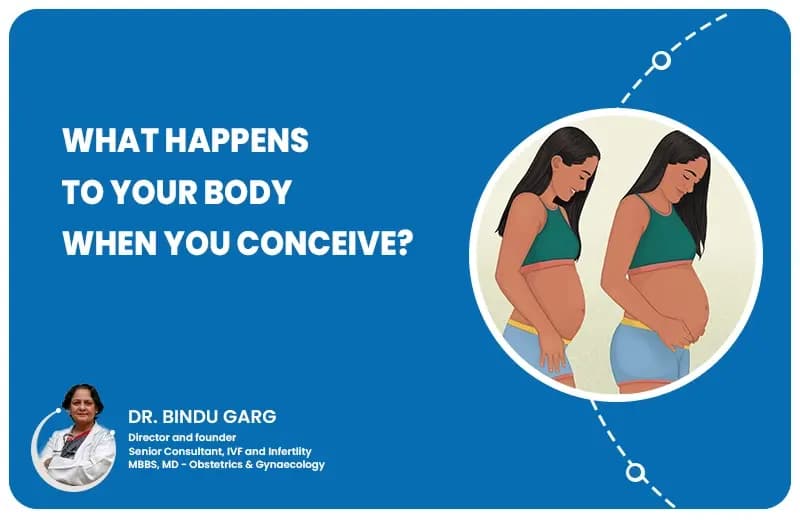
What Happens to Your Body When You Conceive?
Pregnancy is a profound experience that changes not only your life but also your body in ways that can be both surprising and awe-inspiring. Understanding what happens to your body when you conceive helps you prepare emotionally and physically for the changes that lie ahead.
This blog explores the incredible journey of changes in the body after pregnancy, from immediate changes to the gradual changes that prepare your body to nurture a new life. You will find information about everything from hormonal fluctuations to emotional ups and downs, helping you embrace the early changes of pregnancy with confidence and peace.
Knowing these signs can be especially important for couples who are on an IVF journey and are eager to spot the early signs of success. With trusted information from Dr. Bindu Garg, one of the best IVF doctors in Gurgaon, this guide provides clarity, comfort, and support for each step of your conception journey.
Early Signs of Conception
When conception occurs, the body begins to respond in subtle ways, many of which are often misinterpreted as signs of the menstrual cycle. Some of the earliest and most common signs include:
- Missed Period: The first sign of pregnancy is a missed period. While stress, illness, or changes in routine can also cause a delay in menstruation, a missed period is one of the most reliable early signs of pregnancy.
- Breast Tenderness: Hormonal changes after pregnancy often lead to increased sensitivity and tenderness in the breasts. The areola may also darken and veins may become more pronounced as the body prepares to nourish the growing fetus.
- Morning Sickness: Nausea, often called "morning sickness," can occur soon after conception and last for several weeks. Although it is most commonly experienced in the first trimester, some women may experience it throughout pregnancy.
Hormonal Changes
Conception triggers a release of hormones in the body that aid in the development of the foetus. Key hormones include:
- Human Chorionic Gonadotropin (hCG): This hormone is produced by the placenta immediately after implantation and is detected by pregnancy tests. Increased levels of hCG are important for maintaining early pregnancy.
- Progesterone: Often called the "pregnancy hormone," progesterone helps maintain the uterine lining and prevent early contractions. It also raises body temperature, which can make you feel hotter than usual.
- Estrogen: Estrogen levels increase significantly during pregnancy, helping in the baby's growth and improving blood circulation.
These hormonal changes are responsible for many of the early pregnancy symptoms and contribute to many of the physical and emotional changes you experience.
Physical Body Changes After Conception
Once conception occurs, your body begins to adapt and change rapidly to accommodate the growing fetus. These changes affect various systems, including the uterus, stomach, and digestive system.
Breast Changes During Conception
As hormone levels change, one of the first physical symptoms you'll notice is increased breast tenderness and swelling. The breasts may feel heavier, and the nipples may become more sensitive or darker. These changes are necessary as the body prepares to make milk and support the growing fetus.
Energy and Fatigue Levels
Extreme fatigue is a common occurrence during pregnancy, especially during the early weeks. High progesterone levels can make you feel tired as the body works overtime to nourish the growing baby. It's important to rest and listen to your body's cues during this time so you don't feel overtired.
Emotional Changes Post-Conception
Hormonal changes don't just affect the body—they also have a significant impact on emotions. Increases in progesterone and estrogen can cause mood swings, anxiety, and emotional fluctuations. It's common to feel overwhelmed with emotions or experience irritability or crying spells during the early weeks of pregnancy. These emotional changes are completely normal, but if they become overwhelming, it may be helpful to talk to a healthcare provider or counsellor.
Digestive Changes and Nausea
The digestive system changes with pregnancy, with many women experiencing nausea and appetite changes. Morning sickness, often referred to as nausea or vomiting, is caused by hormonal changes and the body's adjustment to pregnancy. Some women may have food aversions or cravings, as well as bloating or constipation.
Cardiovascular System Adjustments
The cardiovascular system makes important adjustments as the body prepares to nourish the fetus. Blood flow increases to support the growing baby, often causing a slight increase in heart rate. The increased blood volume helps ensure that both mother and baby get the oxygen and nutrients they need. You may also notice that you feel short of breath with even mild exertion, due to these circulation changes.
Immune System Adaptation
The immune system also adapts to support pregnancy. Early in pregnancy, the immune system must strike a balance between protecting the body and not rejecting the growing fetus, which is genetically different. This adaptation is vital for a healthy pregnancy and usually goes unnoticed, although some women may have mild flu-like symptoms due to immune changes.
Skin and Hair Changes After Conception
Many women experience changes in their skin and hair after pregnancy due to the increase in pregnancy hormones. Some women may experience glowing skin due to increased blood flow, while other women may experience changes in skin color, such as darkening of the areola or the appearance of a dark line (linea nigra) down the centre of the abdomen. Additionally, hormonal changes may cause hair to appear thicker, or on the other hand, some women may experience thinning or hair loss.
Importance of Nutritional Needs During Conception
Once you become pregnant, your nutritional needs change drastically. Your body needs more vitamins, minerals and other essential nutrients to support foetal development and maternal health. A balanced diet rich in folic acid, iron, calcium and protein is essential for the early stages of pregnancy. It is important to start taking prenatal vitamins and ensure you are eating nutrient-rich foods.
Signs to Consult a Specialist Early in Pregnancy
While many of the physical changes that occur after conception are completely normal, some signs may indicate the need to seek professional medical advice. If you experience heavy bleeding, severe cramping, intense nausea, or signs of infection, it is essential to consult a healthcare provider. Early consultations help ensure a healthy pregnancy and provide you with the support and guidance you need as you go through these changes in your body.
Role of the Best IVF Doctor in Gurgaon
If you have undergone in vitro fertilisation (IVF) or assisted reproductive technology (ART) procedures, consulting an experienced IVF doctor in Gurgaon like Dr Bindu Garg can provide invaluable support. IVF specialists play a vital role in guiding you through the early stages of conception and pregnancy, providing expert advice and monitoring to ensure a successful outcome. Whether you are undergoing IVF or natural conception, early guidance from an experienced doctor can help ease concerns and provide peace of mind.
Frequently Asked Questions (FAQs)
Q1. What are the earliest signs of conception?
Early symptoms include missed periods, nausea, breast tenderness, and fatigue.
Q2. How soon do hormones change after conception?
Hormonal changes begin almost immediately to support the fetus.
Q3. What causes morning sickness?
Hormonal changes affect digestion, often resulting in nausea and vomiting.
Q4. Why do women feel more tired after conception?
The body uses extra energy to support the growing fetus, causing fatigue.
Q5. Is it normal to experience emotional changes after conception?
Yes, hormonal changes often affect mood and emotions.
Q6. When should I consult a fertility specialist?
If you experience unusual symptoms or have a poor medical history, it is advisable to consult a specialist.
Conclusion
Conception is the beginning of a life-changing journey. Your body will go through many physical, hormonal and emotional changes in the early stages of pregnancy. Understanding these changes not only helps you be prepared but also helps you seek the right support when needed. Whether you are experiencing breast tenderness, fatigue, nausea or mood swings, remember that all these changes are part of the beautiful process of developing new life. And if you want guidance during this time, consulting an expert can make a huge difference in ensuring a healthy and successful pregnancy.
Content Created By:

CyberBizz Technologies
Team - Content Curator